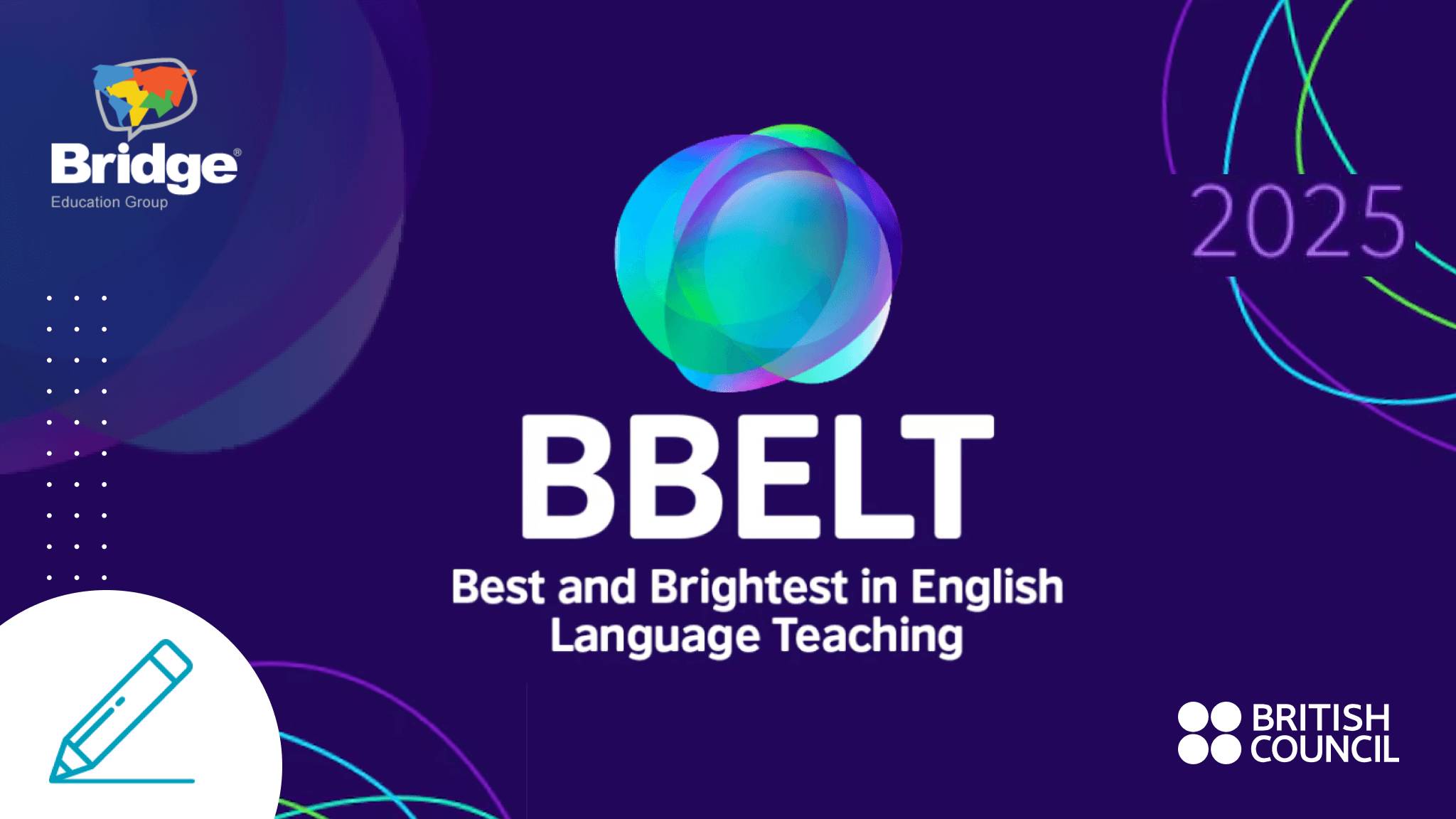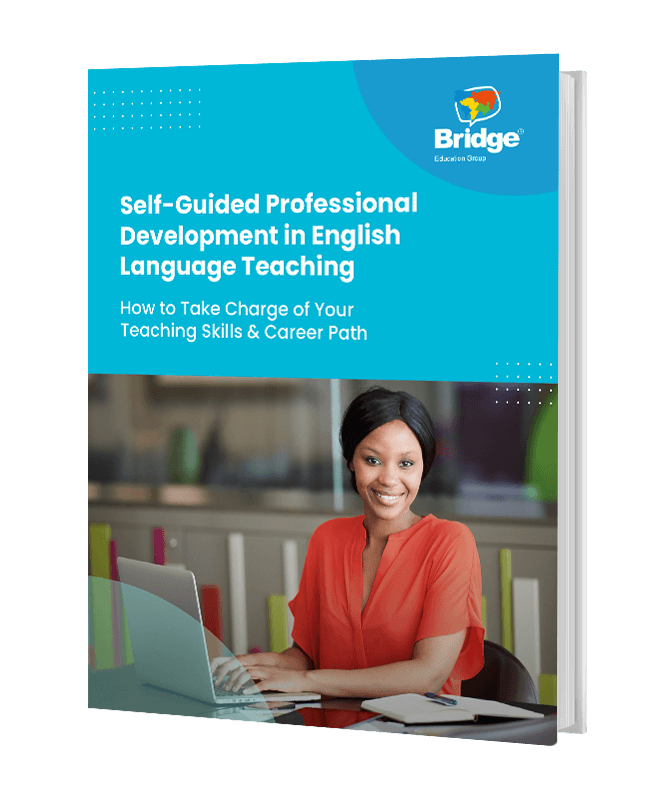The 2025 BBELT Conference brought together English teaching professionals from around the world in a rich, all‐online setting. Centered around the theme “Shaping Brighter Futures Through ELT,” the event was filled with new ideas, practical strategies, and inspiring conversations. From reimagining assessment to embracing AI and self-directed professional development, the conference offered a powerful glimpse into where English teaching is headed – and how English teachers can lead the way.
Bridge’s Commitment to Professional Growth
Although the conference was completely virtual, Bridge Education Group stood out for its ongoing commitment to quality teacher training.
Bridge demonstrated this commitment by offering a wide range of professional development opportunities, including the 120‑hour Master Certificate, the 150‑hour IDELTOnline™, the 80‑hour 21st-Century Skills Micro-credential Bundle, and a Specialized Certification course of the recipient’s choosing. In addition to donating courses, Bridge extended a discount code for all TEFL courses to conference participants.
Bridge also hosted a virtual booth and participated in a live “Chat with” session, where attendees were invited to join a short on-screen presentation to learn more about Bridge’s teacher training and professional development programs.
These efforts exemplify Bridge’s mission to empower educators worldwide and serve as a model for continuous learning and practical improvement in classrooms everywhere.
Begin your ELT journey or take the next step in your career with
Accredited Online TEFL/TESOL Certification
Explore CoursesKey Takeaways from Four Insightful Sessions
Evolving Trends in English Language Teaching and Professional Practices – Susan Dawson
Susan Dawson’s session opened the door to a deep discussion on how English language teaching is evolving in our digital age. She examined the need to balance time‑tested teaching methods with the promise of new technologies. Dawson argued that being a great teacher today requires both a respect for traditional practices and an openness to change.
Key takeaways:
-
Embrace Change: Dawson reminded us that change is a constant in education. “Teachers must change with the times and learn new ways to connect with students,” she said. This simple yet powerful statement challenges us to view change as an opportunity rather than a threat.
-
Leveraging Digital Tools: By sharing real-life classroom examples, she illustrated how digital tools, such as interactive online activities and virtual breakout sessions, can energize teaching. Digital resources can foster engagement by offering personalized learning experiences while still supporting the fundamental principles of good teaching.
-
Blending Old and New: Dawson shared strategies on integrating classic teaching methods with digital innovations. She described instances where teachers used digital assessments alongside traditional discussions to obtain a clearer picture of student progress. This blended approach can help create more responsive classrooms that address diverse student needs.
Her detailed explanation and practical examples provided educators with a clear roadmap to navigate a rapidly changing landscape. Dawson’s session was not just theoretical – it gave teachers a handful of ideas to experiment with immediately.
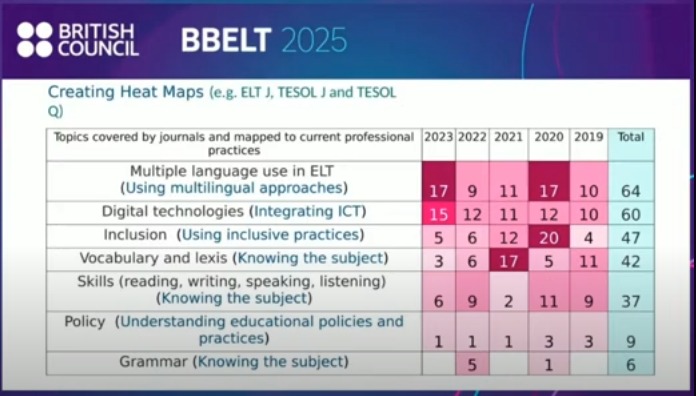
A Human-Centered Approach to GenAI in Language Acquisition – Raquel Ribeiro
In her session, Raquel Ribeiro introduced the promising role of generative AI (GenAI) in language acquisition. Her approach was refreshingly simple, cutting through technical jargon to focus on what truly matters: keeping teaching human and personal.
Key takeaways:
-
Preserving Human Connection: Ribeiro’s core message was that technology should serve teachers, not replace them. “GenAI helps free up time for real human connection in the classroom,” she explained. Her words invite educators to use AI as a supportive tool that handles routine tasks, giving them more time to interact with students.
-
Real-World Applications: She provided tangible examples of how GenAI can streamline processes such as grading, generating personalized practice exercises, and giving immediate feedback. These applications reduce administrative workload and allow teachers to concentrate on the creative aspects of teaching.
-
Balanced Integration: Ribeiro emphasized that the integration of GenAI should be carefully balanced. While technology can offer efficiency and precision, it should never come at the expense of the teacher-student relationship. Her guidelines for a balanced approach included starting small, testing new tools in limited scenarios, and always monitoring student engagement.
Ribeiro’s talk made a potentially intimidating subject accessible. Her friendly tone and practical suggestions demystified GenAI and sparked enthusiasm about using technology to enhance, rather than disrupt, meaningful learning experiences.
Discover 8 AI-powered content creation tools to help English teachers work smarter, not harder.
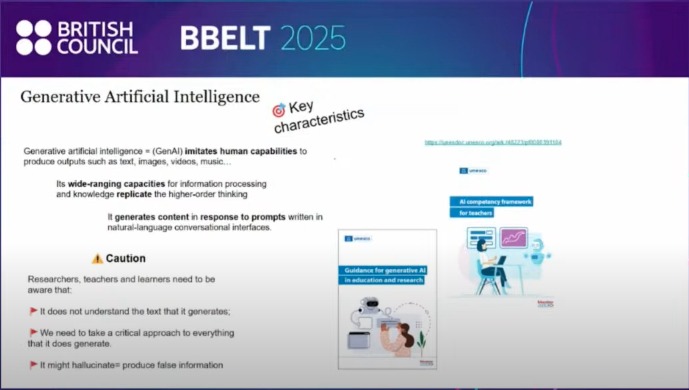
Teachers’ Agency in CPD – The Road Not Taken – Jorge Chacón
Jorge Chacón’s session was a powerful call to action that centered on teacher agency in professional development (CPD). Chacón inspired the audience with his message that true growth happens when teachers take the initiative in their own learning journey.
Key takeaways:
-
Empowerment Through Autonomy: Chacón drove home the idea that teachers should not wait for external mandates to improve; they must lead their own development. “When teachers take control of their own growth, they learn faster and spark change in their classes,” he told participants. His message was both empowering and liberating.
-
Collaboration and Community: While self-guidance is crucial, Chacón also stressed the importance of sharing experiences with peers. Working together on CPD initiatives, forming study groups, and engaging in mentorship can create a supportive network that multiplies the benefits of individual efforts.
-
Step-by-Step Progress: Chacón’s session emphasized that big changes result from small, consistent improvements. He suggested practical strategies such as setting daily learning goals, maintaining a reflective journal, and regularly reviewing classroom practices. This stepwise process makes professional development manageable and measurable.
Chacón’s detailed tips and personal stories brought his message to life. Teachers walked away with concrete ideas to incorporate into their daily routines, making the pursuit of professional excellence feel both achievable and necessary.
Explore the many benefits of professional development in ELT.
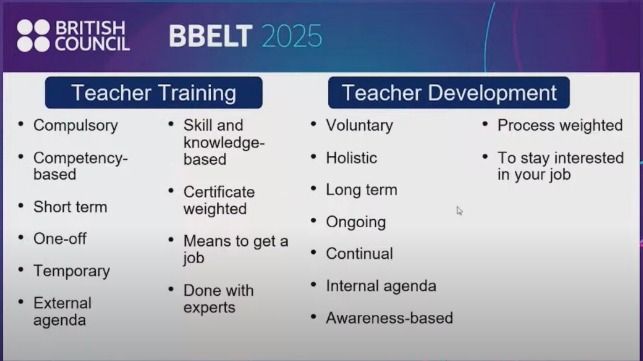
The CEFR as a Tool for Formative Assessment – Jaber Ahmad
Jaber Ahmad’s presentation on the Common European Framework of Reference (CEFR) transformed how we view assessments in the classroom. He argued that the CEFR is a scoring guide and a flexible tool that can drive meaningful, ongoing student improvement.
Key takeaways:
-
Beyond a Static Scale: Ahmad explained that the CEFR can do much more than assign a score or level. It can actively highlight areas where students need support and set clear, targeted goals for improvement.
-
Interactive and Ongoing Assessment: Instead of treating assessments as a one-off event, Ahmad showed that using the CEFR can turn evaluation into a continuous dialogue. This method fosters an environment where feedback is regular, timely, and tailored to each student.
-
Customization in Teaching: Ahmad’s approach encourages teachers to use the CEFR to design individualized learning plans. By recognizing each student’s unique challenges and strengths, educators can create lessons that directly address gaps while reinforcing progress.
Ahmad’s session demystified the concept of formative assessment and offered a practical framework that teachers can adopt immediately. His insights encouraged a shift from viewing assessments as final judgments to seeing them as integral parts of the learning process.
Not sure how the CEFR and GSE actually work? Check out this guide that breaks down what these frameworks mean for teachers.
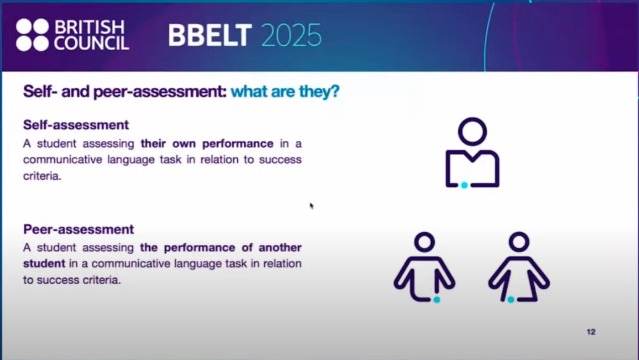
A Roadmap for Modern English Teaching
The 2025 BBELT Conference delivered a powerful message: the future of English teaching depends on the ability to adapt, innovate, and take charge of one’s own growth. Each session contributed a unique perspective that, when combined, creates a comprehensive roadmap for modern teaching.
-
Adaptability is Key: Susan Dawson’s ideas emphasized that teaching must evolve. By blending proven methods with new digital tools, educators can create classrooms that are both effective and engaging. Her concrete examples demonstrated how change can be implemented in small, manageable steps.
-
Technology as a Partner: Raquel Ribeiro’s session taught us that technology, specifically GenAI, should be a helping hand. Her focus on preserving human connection while using technology to eliminate repetitive tasks is a model for balanced, thoughtful integration.
-
Taking Charge of Professional Development: Jorge Chacón’s message about self-driven CPD is both inspiring and practical. His emphasis on teacher agency and collaborative learning provides a clear framework for how educators can drive their own improvement without waiting for external mandates.
-
Reimagining Assessment: Jaber Ahmad showed us that assessment, when approached correctly, can be a supportive tool rather than a source of stress. His use of the CEFR as a dynamic resource underscores the importance of tailoring feedback to help each student progress.
Collectively, these sessions reveal that the challenges of today’s educational landscape are best met with a blend of tradition and innovation. Teachers who embrace change, harness technology, take initiative in their development, and rethink assessment methods are well-positioned to inspire and succeed in their classrooms. This holistic approach not only enhances student learning but also strengthens our professional community.
Map out your unique career path with the free guide to
Self-Guided Professional Development in ELT
downloadConclusion
The 2025 BBELT Conference was a milestone event that provided clear, practical insights for English teachers everywhere. The sessions by Susan Dawson, Raquel Ribeiro, Jorge Chacón, and Jaber Ahmad offered actionable strategies that can transform our teaching practices—from embracing technology and adapting to change to taking ownership of professional development and making assessments more supportive.
By integrating these lessons into everyday teaching, educators can build a future where teaching is more dynamic, inclusive, and effective. Continued learning and innovation remain essential to driving meaningful change in the field of English language teaching.





